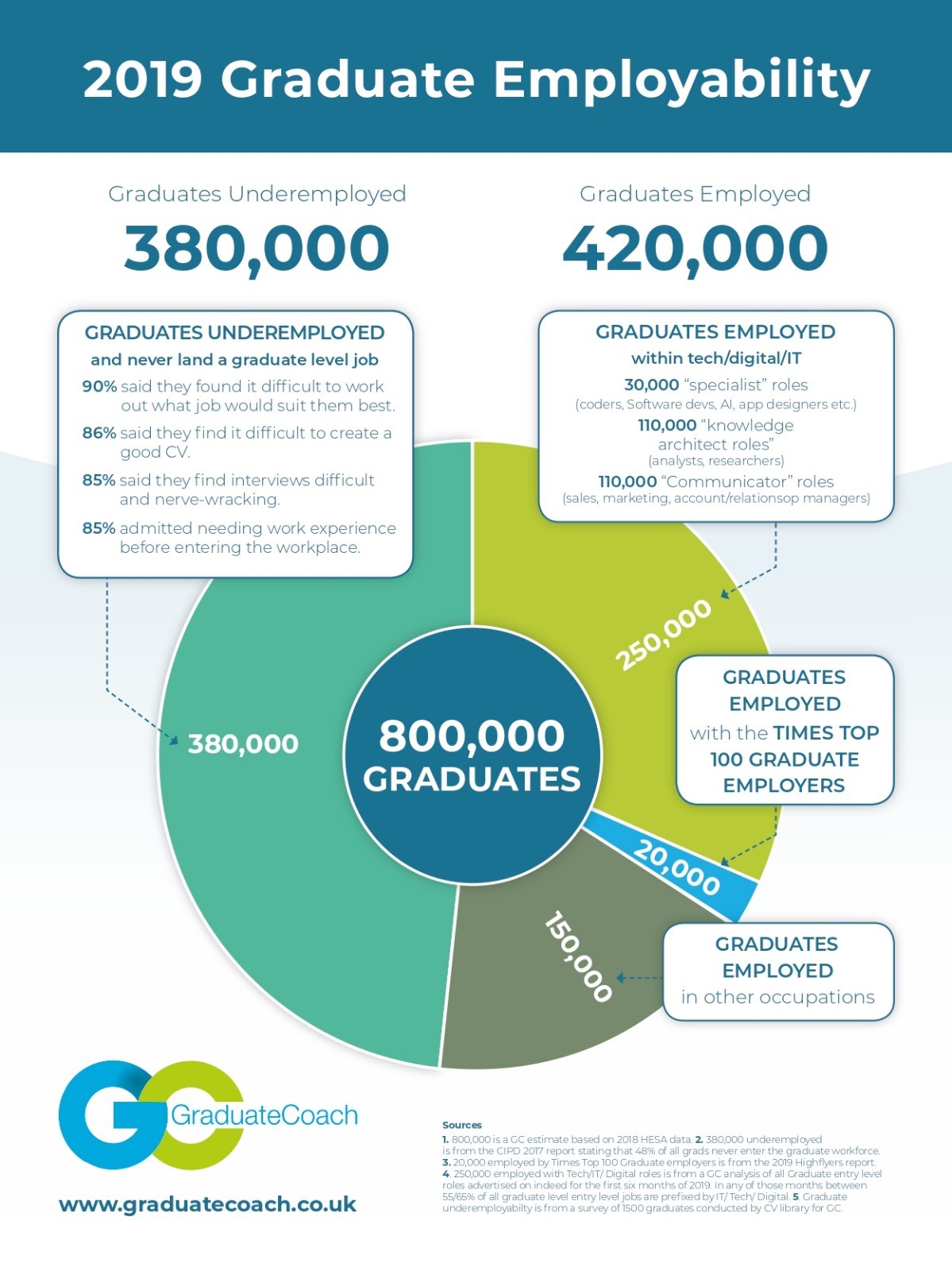Essential 10 tips for graduates searching for a job during the global pandemic

Although most of the world may be in various states of lockdown at present, the job market has certainly not been put on hold.
Some headlines will be a cause for concern in many graduates seeking employment during the global pandemic.
A recent YouGov survey published by Bright Network revealed the serious impact that the Coronavirus has had on students applying for graduate jobs.
Students report anxiety over future prospects due to COVID-19 pandemic: #COVID19 pandemic has impacted confidence about future careers as roles are paused or withdrawn 80% of graduates are worried that COVID-19 will affect their university grades and… https://t.co/l8StgSd0Zx pic.twitter.com/mVcLB7pQ3M
— FE News – The #FutureofEducation News Channel (@FENews) April 16, 2020
The abrupt loss of the last term of their final year has had a disorientating effect on this year’s graduates leaving them bereft of friendships, final exams and graduation ceremonies. Planned work experience, internships and graduate recruitment programmes may well have been placed on pause.
However, despite what the headlines might suggest the current situation is not one which should leave you disconsolate and feeling as though your chances of getting the graduate job of dreams have disappeared. It is hard to imagine any real positive to come out of the pandemic but the effect on the job market still presents opportunities for graduates in search of employment.
This article aims to offer a guide for students feeling stumped by the effect of the Coronavirus on their prospects of earning a graduate job after university.
For graduates searching for a job during the global COVID-19 pandemic, it is important to recognise that the employment market has changed. If these are uncertain times for those in search of employment, they are equally uncertain for those offering employment.
The path to securing a job may be markedly different but well prepared, focussed graduates will still have the edge. This article aims to guide graduates through the job market during these unprecedented times and prepare them as best as possible to improve your chances of employment in the current climate.

#1: Brush up on Your Digital Skills
A high proportion of graduate jobs were already digitally focused as it was; the effect of lockdown has been that even more work is required to be done online and more digital roles are likely to have been created in response to the pandemic.
This ever-increasing number of digital jobs is displayed in this infographic from the Graduate Coach, where the high proportion of graduates being employed within this field can be seen.
Search Strategically: You might assume that searching for jobs does not involve any real form of strategy and the method is just to expeditiously dive in and apply until you are successful.
However, it will be more beneficial to your prospects to adopt a more methodical approach to your job searching, and keeping in mind your personal preferences when it comes to what kind of job would work for you. These 4 steps give a systematic approach for graduates looking for employment.
#2: Identify Your Graduate Job Typology
Before you begin searching for jobs it is hugely important to pinpoint exactly what type of graduate job you would be suited to.
Figuring this out will help to guide your career pathway towards jobs that are right for you, and not applying just for the sake of it.
there are 3 typologies of graduate jobs that you find, think about which one would be most appropriate to your skillset.
The 3 career typologies explained:
- Specialist – companies hire these graduates for their core knowledge and expertise in a specific field. Examples of graduate roles for specialists include: Doctor, pharmacist, computer scientist, engineers, designers etc.
- Knowledge Architect – companies hire these graduates for their ability to analyse data and derive actionable insights for making informed business decisions. Examples of graduate roles for knowledge architects include: analysts, consultants, accounting and finance-related roles etc.
- Communicator – finally, companies hire graduates who are communicators to form and maintain viable business relationships with clients, and to facilitate effective communication between departments. Examples of graduate roles for communicators include: sales executives, account managers and more people/relationship-focused roles.

#3: Work out What Type of Company Will Suit You Best
Searching for jobs is not just about figuring out if you are suited to them, but crucially figuring out if they are right for you.
You might have an idea of the environment you would feel most comfortable in. Being a small part of a large company may not be your cup of tea and you might be more cut out for working in a smaller company.
Similarly, identifying the culture of the company and whether or not it would fit with your personality is a key feature that you might want to consider.
#4: List out the Skills You Have to Offer
Your skills can be separated into both soft skills and hard skills. The distinction being that whilst your hard skills (teachable abilities) such as your qualifications can be quantified, whereas your soft skills (interpersonal skills) are less measurable as they are more natural. Using the STAR exercise you will develop a greater understanding of your own skills.
#5: Use Google’s Job Search Feature
Google’s job searching tool is a great resource to use because it lets you refine your search by a range of filters such as the date the jobs were advertised. This will be particularly useful during the current Coronavirus situation because whilst some jobs might still be listed on job search sites they might not be employing at this moment in time. Likewise, Otta have recently published a list of companies that are definitely still hiring during the pandemic.
#6: Keep Yourself Proactive
You should expect delays when applying for jobs, unfortunately, the process of being employed or rejected is not instantaneous. Moreover, this process is likely to become slower following the outbreak of Coronavirus as Human Resource departments will have a lot to deal with. Being proactive in between hearing back from people will be beneficial to you.
Be as prepared as possible for each interview that you do. If you are stuck in limbo waiting to hear back from a job application then there is no harm in researching information with regards to other job vacancies. This will mean you are ready to go straight into another interview should you not be successful in your previous application.
#7: Build Up Your Network
Being turned down for a job will almost certainly happen to you at some point, and rather than despair, you can utilise the feedback you receive to boost your chances of success. If you are given feedback after not getting a job you shouldn’t just discard that information.
Use any feedback you get to improve yourself and increase your chances of being hired.
If you request feedback and indeed enquire to the employer about other companies that are hiring then this will reflect well on you. It can also crucially allow you to build your network.
#8: Approach Smaller Companies
Whilst the immediate draw for a lot of graduates will be to go after the top-ranking big companies, the reality of the chances of being employed by this calibre of company might have been reduced by the halting of recruitment programmes by major graduate employers. Large multinational companies such as Lloyds Banking Group, HSBC and accountancy firms PwC and BDO have already admitted they will be forced to change their recruitment plans.
Even in normal times, being rejected by these larger corporate companies is to be expected if you do not have much prerequisite experience. In the aftermath of Coronavirus, large companies may need to scale down their workforce. Therefore, it will pay dividends to look beyond the big names to a more diverse range of employers.
That is not to completely rule out applying for a role in a larger company but unless you have a wealth of experience and top tier qualifications it is unlikely that you will be offered a job immediately.
The better approach would be to apply for jobs in a smaller company thus allowing you to find your feet in the job market and gain some vital experience.
#9: Be Prepared for Video Interviews
Whilst the usual tips for conducting a job interview remain the same as ever, performing your interview through the medium of video call may be an unfamiliar and even more daunting prospect than normal. Although many will find it easier to undertake interviews in this way, the basics of interview strategy still hold true.
The need to become confident with your video interviews will be hugely important. Guidance available which is specifically tailored towards video interviews is quite scarce online. Fortunately, the Graduate Coach’s includes a module focused entirely on mastering video interviews. Also included is a video interviewing tool to enable you to be able to practice it.
Tips for video interviews:
- Dress smartly: just because the interview is being conducted from home you should still dress as though you were being interviewed in person.
- Find a good spot in the home to conduct the interview, ideally one that looks professional.
- Ensure you are in a good place for WiFI, you don’t want to have a conversation halted by buffering.
- We’ve all seen the embarrassment that an unexpected background intruder can cause so ensure you will be free from disruption during your interview.
- Write down some notes in preparation or possible answers to some likely questions.
#10: Accept Your Job Offer
Put in the simplest of terms, if you are offered a job you should take it. You should have done enough research about the company in advance to know that this is the type of role and the type of organisation that you would enjoy and where you can gain valuable experience. Being able to gain experience is vital for developing your career and building towards your long term career goals. Not everyone will start off with the job they were necessarily aiming for, but being able to grow your CV will vastly improve your credentials.
You want to avoid a period of prolonged inactivity for a number of reasons but partly because you might become disenfranchised from your job hunt. If you turn down jobs that are offered to you, then you may find that they begin to dry up.
Despite what the headlines might say, you need not worry if you are a graduate or soon to be a graduate because the opportunities will always be there for motivated graduates even in a time of crisis. Flexibility and adaptability will be essential but by maintaining your motivation and by taking a strategic approach, you will find a graduate role.
Paddy Drew, Graduate Coach











Responses